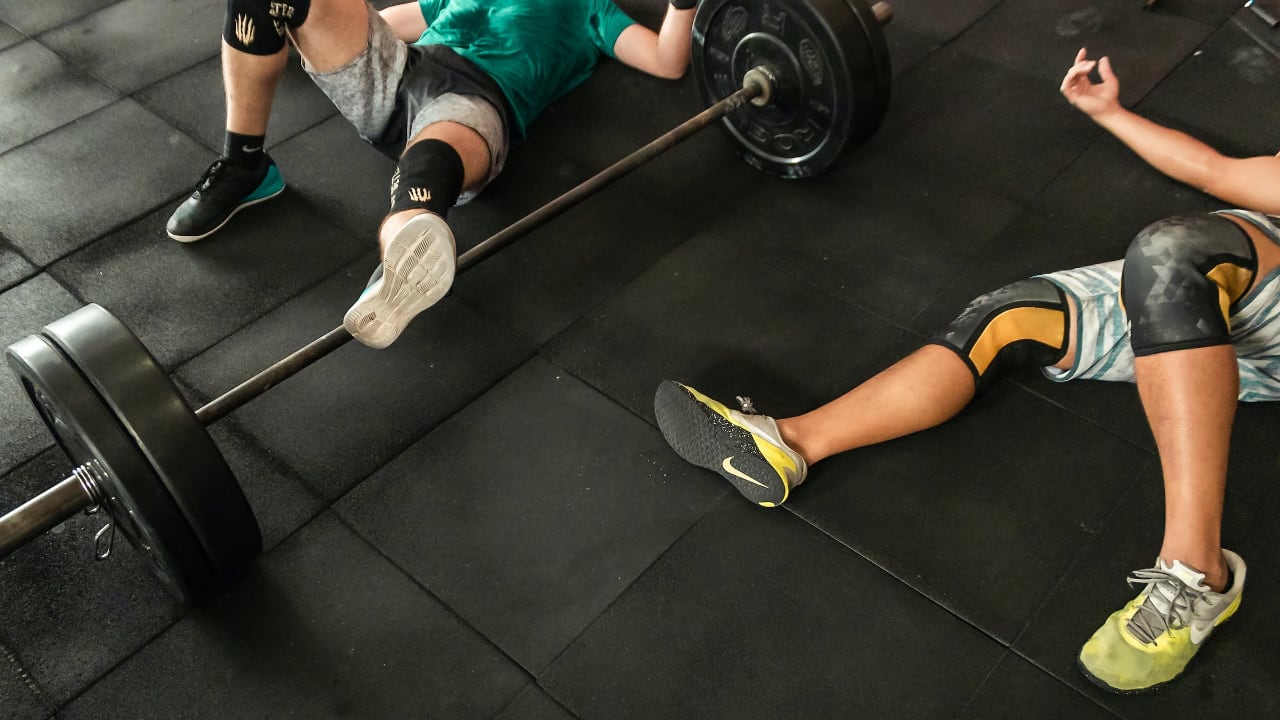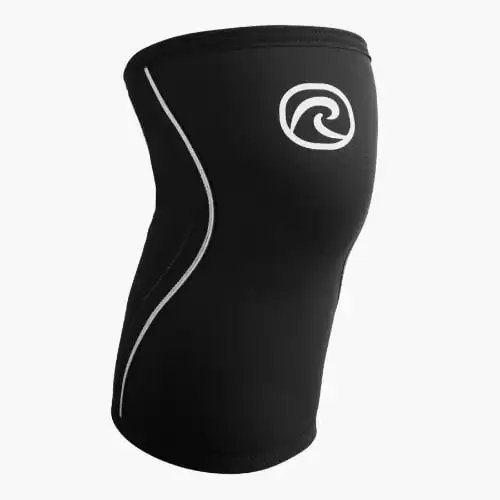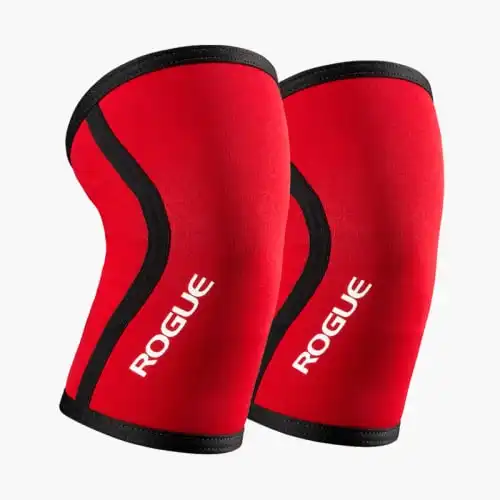Updated November 8, 2023
When you participate in high-intensity workouts such as CrossFit, your knees can take a beating. Impact from exercises like box jumps, burpees, and lunges can lead to pain, inflammation, and injury over time. Knee sleeves provide the support and compression CrossFit athletes need to protect their joints during tough WODs.
In this article, we review the best knee sleeves for CrossFit currently on the market. We also provide tips for choosing the right knee sleeves, when to wear them, how to properly care for them, and the many benefits knee sleeves offer hardcore CrossFitters. Gear up and get ready to crush your next workout confidently, knowing your knees are supported and protected.
Our Top Picks For Best Knee Sleeves
When it comes to knee sleeves explicitly designed for CrossFit and high-intensity training, a couple of brands stand out above the rest. These knee sleeves are constructed of high-quality, durable materials, provide maximum support and compression, and are built to handle the demands of high-intensity workouts. Our top picks for the best knee sleeves for CrossFit are:
Available in both 5mm and 7mm thicknesses, the Rehband RX Knee Sleeves are specifically designed to support the knee during CrossFit movements.
Rehband is one of the most trusted brands for knee sleeves and their 7mm model is ideal for CrossFit. The 5mm and 7mm thicknesses provide heavy-duty support for lifting and high impact exercises. They are made of neoprene and lined with a soft fabric for comfort. The snug yet flexible fit won’t restrict your range of motion.
Rehband knee sleeves are a bit pricey but are extremely well-made and long-lasting. For maximum support, the 7mm is a great choice for CrossFit athletes. Our long history using this particular knee sleeve is what barely edges it out over our runner-up pick.
One of the best options and values for CrossFit athletes, these knee sleeves offer a range of support and thickness to suit various preferences and workout intensities.
Our runner-up pick is also our pick for best value, with knee sleeve pairs currently priced similar to a single Rehband sleeve. Rogue Fitness is widely known for their top-of-the-line American made equipment, so their knee sleeves are purpose-built for CrossFit. With 3, 5, and 7mm options the Rogue offers a variety of options while being one of the few American-made knee sleeves on the market. Made of thick neoprene with reinforced stitching to handle heavy loads and high reps, they provide strong compression (varying on thickness) and support for your knees without restricting movement. They represent an affordable, high-quality choice for CrossFit knee sleeves.
Why You Need Knee Sleeves for CrossFit
CrossFit workouts can place a lot of stress on your knees due to the volume of high-impact exercises like box jumps, lunges, and burpees. Knee sleeves are essential gear for any serious CrossFit athlete. Here are some of the main benefits of wearing knee sleeves for CrossFit:
Protect Your Knees from Impact
Impact during high-intensity interval training can lead to pain, swelling, and injury over time. Knee sleeves absorb shock and provide cushioning to protect your knees from the impact of exercises like box jumps, lunges, and double-unders. This allows you to push through tough WODs with confidence, knowing your knees are supported.
Reduce Knee Pain
Knee sleeves apply compression to provide warmth, improve circulation, and relieve pressure on your joints. This can help reduce pain from chronic knee conditions like arthritis, tendonitis, or inflammation. The snug, insulating fit of knee sleeves helps ease discomfort from old knee injuries. For many CrossFit athletes, knee sleeves make the difference between suffering through a workout in pain or enjoying a workout pain-free.
Improve Performance
When your knees feel supported and pain-free, you can focus on performing at your best during each WOD. Studies show that knee sleeves may even provide a slight “spring-like” effect that helps you squat more weight. The compression also helps stimulate your muscles and keeps them warm throughout long, intense workouts.
Increase Stability
Knee sleeves wrap snugly around your joints to provide stability and help keep everything aligned properly during exercise. This is especially important when performing Olympic lifts like squats, cleans, and snatches with heavy weights.
Knee sleeves reduce wobble and keep your knees tracking properly over your ankles for better form and less risk of injury. For CrossFit athletes, stable knees mean more confidence to push your limits.
How to Choose the Right Knee Sleeves
With so many knee sleeve options available, it can be difficult to determine which ones are right for CrossFit. Here are some tips for choosing knee sleeves that will provide maximum support and performance for high-intensity workouts:
Consider the Thickness
Thicker knee sleeves, in the range of 5mm to 7mm, are typically best for CrossFit. The 7mm thickness provides the most robust support for lifting heavy weights and high-impact exercises. However, some people find 5mm or 6mm knee sleeves offer enough support while still maintaining good flexibility. Ultimately, choose a thickness that gives you the confidence to push hard while still feeling comfortable.
Get the Right Fit
Knee sleeves should fit snugly but still comfortably without cutting off circulation. They should not slide or bunch behind your knees during exercise. Measure around your knee joint to determine your size and consider any swelling that occurs during workouts.
It is best to choose knee sleeves that provide light to moderate compression. For CrossFit, you want maximum support with a full range of motion, so avoid knee sleeves that are too tight or loose.
High-Quality, Durable Materials
Look for knee sleeves made of neoprene, a durable, flexible, and water-resistant material. Neoprene provides insulation, compression, and longevity. Some knee sleeves also incorporate latex or silicone grips and reinforced stitching for added support and to prevent slipping.
For CrossFit, knee sleeves must be very durable to withstand high-intensity exercise and frequent use. Avoid cheaper sleeves that will wear out quickly.
Designed for Exercise
Choose knee sleeves intended explicitly for athletic use and high-impact exercise. Knee sleeves for arthritis or injury rehabilitation typically do not provide enough support for CrossFit.
Look for knee sleeves marketed to weightlifters, powerlifters, and functional fitness athletes. These are designed to handle the demands of strength and endurance training with features like non-slip grips, flexible yet durable materials, and a snug, ergonomic fit. For the best performance, choose knee sleeves purpose-built for exercise.
When to Wear Your Knee Sleeves
Knee sleeves are especially useful during high-intensity CrossFit workouts or heavy lifts that place extra stress on your knees. Here are some times when you will want to wear your knee sleeves for CrossFit:
During High-Impact WODs
Anytime your workout includes lots of box jumps, lunges, burpees, or other exercises that pound your knees, knee sleeves are a must. They help absorb shock, provide cushioning, and prevent overuse pain from the impact. Knee sleeves give you the confidence to go all-out during high-intensity intervals without worry.
When Lifting Heavy
Knee sleeves are essential for joint support and stability when performing major lifts like squats, deadlifts, cleans, and snatches. They keep your knees warm and compressed while helping ensure proper form and alignment under heavy loads.
Knee sleeves may even allow you to lift slightly more weight due to the “spring-like” effect and stimulation of your muscles. For any CrossFit workout focusing on maximum lifts, knee sleeves are strongly recommended.
If You Have Knee Pain
If your knees ache from chronic conditions like arthritis or tendonitis, or from an old injury, knee sleeves can help relieve discomfort during exercise. The compression and warmth of knee sleeves help reduce pain and allow you to complete tough WODs with less suffering.
Be sure to talk to your doctor about appropriate exercises and modifications based on your condition. Knee sleeves can aid in pain management but should not be used in place of proper rest, recovery, and medical advice.
For Recovery
In addition to wearing knee sleeves during your workout, you can also use them afterward to speed up recovery. The compression helps reduce swelling in your knees from high-impact exercise. Knee sleeves also provide warmth and support for sore joints after an intense CrossFit session.
For some people, knee sleeves offer relief from knee pain that sets in a day or two after an especially tough workout. Wearing knee sleeves regularly, both during exercise and recovery, may help prevent delayed onset muscle soreness in your knees.

How to Care for Your Knee Sleeves
To keep your knee sleeves in good condition and provide maximum support for your workouts, proper care and maintenance is essential. Here are some tips for caring for your knee sleeves:
Hand Wash and Air Dry
Knee sleeves should be hand-washed in cold water using a mild detergent. Gently agitate and rinse them thoroughly to remove all detergent residue. Avoid machine washing knee sleeves, which can cause damage.
Air-drying knee sleeves away from direct heat is best. Do not machine dry. The air-drying process may cause knee sleeves to stiffen slightly, but they will soften again with use. Air drying helps knee sleeves retain their shape and compression over time.
Soak to Remove Odors
If your knee sleeves develop stubborn odors from frequent use, soak them in a solution of water and white vinegar before washing as usual. The vinegar helps deodorize the material and kill any bacteria. Be sure to rinse them well after soaking to remove all vinegar before air drying.
With regular care, knee sleeves can go many months without developing odors. Still, for heavy use, the occasional vinegar soak may be needed.
Inspect and Replace as Needed
Check your knee sleeves regularly for signs of wear and tear, like holes, thinning fabric, or damaged seams. Replace knee sleeves at the first sign of damage to ensure maximum support and avoid injury. Generally, high-quality knee sleeves will last 6-12 months with regular use 3-4 times per week. It is best to replace knee sleeves once yearly, even if there are no visible signs of damage, to maintain good support.
Remove After Exercise
While knee sleeves provide relief from knee pain during activity and recovery, they should not be worn continuously throughout the day and night. Remove your knee sleeves after exercising to avoid discomfort, irritation, or skin problems from extended use.
Your knees need time without compression each day to maintain healthy circulation. Only wear knee sleeves during exercise, recovery, and any other short periods when you need extra support or pain relief. For chronic knee conditions, you may need to wear knee sleeves for more extended periods, but be sure to consult your doctor for guidance.
In Conclusion
Knee sleeves provide essential support and protection for CrossFit athletes during high-intensity workouts. They help absorb impact from exercises like box jumps and burpees, reduce pain from chronic knee conditions, and allow you to lift heavier weights with confidence.
Wear your knee sleeves during workouts that place extra stress on your knees, when lifting heavy loads, or if you have knee pain. Remove knee sleeves after exercise, and properly care for them to extend longevity.
While knee sleeves aid performance and recovery, they should supplement your training rather than become a crutch for your knees. Maintain natural joint mobility and strength by exercising without knee sleeves regularly. Only use knee sleeves when the additional support and protection they provide is genuinely needed for high-intensity intervals or maximum lifts.
By following these guidelines, knee sleeves can help keep you doing what you love – crushing WODs and pushing your limits – for the long haul. Your knees will thank you!








